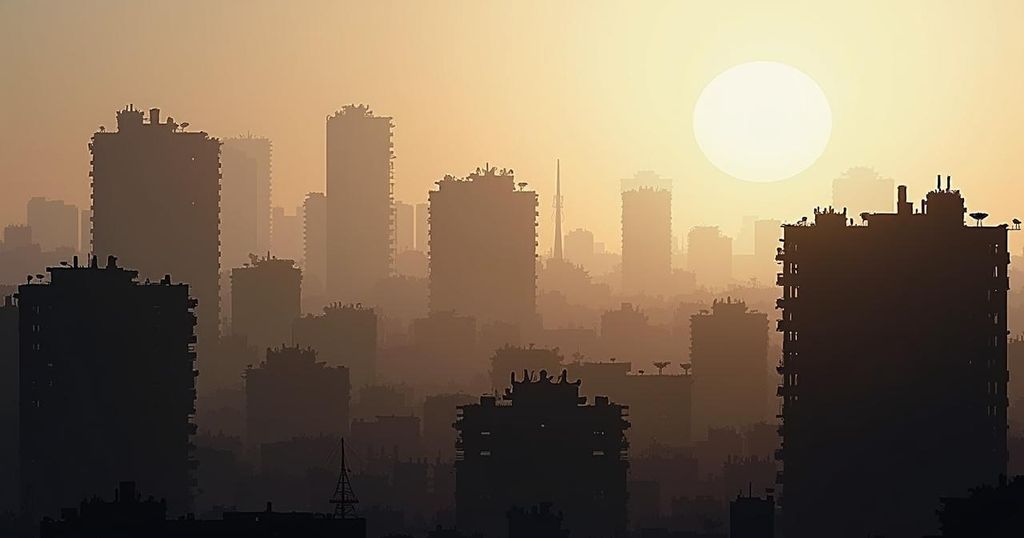Israeli air strikes in Beirut and southern Lebanon have resulted in extensive casualties and damage. Prime Minister Netanyahu declared a commitment to eliminate threats from Hamas and Hezbollah, linking military actions to Israel’s right to defend itself. The humanitarian crisis deepens, with thousands injured and significant destruction reported, while international responses emphasize urgent humanitarian needs.
Israel has intensified its military operations in Lebanon, conducting heavy air strikes that have resulted in substantial destruction, particularly in the southern suburb of Beirut known as Dahiyeh. As emergency responders rush to assist, the current casualty toll is alarming, underscoring the humanitarian crisis unfolding in the region. Israeli Prime Minister Benjamin Netanyahu, addressing the United Nations, reiterated his government’s determination to dismantle Hamas and Hezbollah, stating, “Hamas has got to go,” warning that if the group remains, it poses an ongoing threat to Israel. Netanyahu indicated that Israel would persist in targeting Hezbollah until its objectives along the Lebanese border are achieved, stating, “Israel has every right to remove this threat and return our citizens to their home safely.” His remarks reflect a broader strategy aimed at mitigating perceived threats from Iran, which he accused of endangering stability throughout the Middle East. The ongoing military campaign has resulted in significant loss of life, with reports indicating over 41,000 fatalities in Gaza and approximately 700 in Lebanon due to the air strikes. Netanyahu insisted that these actions are necessary for Israel’s self-defense against groups he labeled as “savage murderers” seeking to undermine civilization itself. At the UN, amid rising tensions, Turkey’s delegation walked out in protest during Netanyahu’s address. Philippe Lazzarini, head of the UN agency for Palestinian refugees, has warned about the precarious funding situation for operations in Gaza, calling for sustainable support in light of the humanitarian needs projected in the aftermath of the hostilities. In Lebanon, civilian casualties continue to mount with reported air strikes killing additional people in various regions, including Baalbek and the central Bekaa Valley, where recent bombing campaigns have resulted in widespread destruction. The humanitarian situation is dire, as hospitals become increasingly overwhelmed, with current reports indicating that approximately 5,000 individuals are hospitalized due to injuries sustained during the conflict. The UN humanitarian coordinator for Lebanon has described the latest escalations as cataclysmic, characterizing the current environment as the deadliest Lebanon has experienced in a generation and warning of further deterioration.
The ongoing conflict between Israel and militant groups in Gaza and Lebanon has escalated sharply, with Israel undertaking extensive military operations that have drawn widespread international attention and concern. Israeli leadership, particularly Prime Minister Netanyahu, expresses an unwavering stance on eliminating threats posed by groups such as Hamas and Hezbollah, connecting these efforts to broader regional stability and security against Iranian influence. The humanitarian repercussions of these military actions are catastrophic, with rising civilian casualties and significant destruction in densely populated urban areas. International organizations, including the UN, have been monitoring the situation closely, emphasizing the urgent need for humanitarian aid and long-term solutions to the ongoing crisis.
The recent military escalation by Israel in Lebanon and Gaza has led to immense human suffering and a precarious humanitarian situation, raising pressing questions about the path towards de-escalation. Prime Minister Netanyahu’s firm stance on dismantling militant threats reflects broader regional tensions linked to Iranian influence. The situation in Lebanon is particularly dire, with the UN and other humanitarian agencies struggling to respond to the overwhelming needs of civilians caught in the conflict. Without immediate international intervention and sustainable funding mechanisms, the situation is likely to deteriorate further, posing significant risks not only to regional security but also to global peace efforts.
Original Source: www.aljazeera.com






